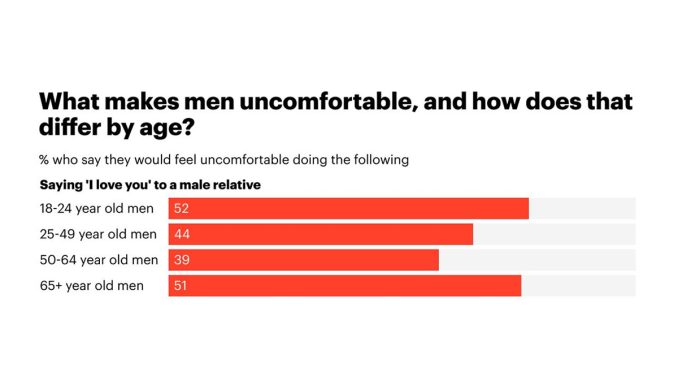
Despite the traditional norms of masculinity depicting men as obsidian sentinels, capable of withstanding anything, this couldn’t be further from the truth. So researchers set out to make an attempt at getting some hard data on what actually makes men not feel comfortable.
YouGov, the market research and data company recently published a poll asking men what sort of actions would make them uncomfortable. They posted the findings and a comparison to similar answers given by women. Users on X (formerly Twitter) shared their thoughts about the state of the male psyche and their own experiences.
More info: X
Public opinion and market research company YouGov posted its data on what makes men uncomfortable on X
Image credits: Nathan Dumlao (not the actual photo)
The poll asked men how they would feel about different activities
Image credits: YouGov
They shared the generational breakdown of the data
Image credits: YouGov
Image credits: YouGov
Image credits: YouGov
Image credits: Ivan Samkov (not the actual photo)
In modern discourse, the term “toxic masculinity” gets thrown around so often that its meaning might slip through the cracks. Terry Kupers, from the Wright Institute, a private graduate school focused on psychology, has attempted to define it as “the constellation of socially regressive male traits that serve to foster domination, the devaluation of women, homophobia, and wanton violence, the need to aggressively compete and dominate others.”
Image credits: Pavel Danilyuk (not the actual photo)
While this definition focuses on the actions, most men probably don’t think they are attempting to dominate anyone else. So instead, it’s perhaps more worthwhile to explore the effects of toxic masculinity, instead of arguing about the semantics. The poll data provided by YouGov is a great example of this. Simply put, large swathes of men feel uncomfortable doing fairly normal, innocuous things, either out of shame, emotional insecurity, or fear of appearing weak or homosexual.
Image credits: Ladanifer (not the actual photo)
This data shows a clear and persistent generational fear of most normal forms of intimacy. While there could be leeway in situations where an action can be misinterpreted, the fact that some men fear telling an actual loved one that they love them shows that something is not okay. The depths of miscommunication run so deep that applying sunscreen to a friend, a situation that is purely practical, seems uncomfortable. Despite the fact that, practically, both parties are completely aware that this is a platonic case of one friend helping another, just the idea still makes men uncomfortable, as they are just not socialized enough.
Image credits: Tirachard (not the actual photo)
This isn’t the only bit of data indicating that men are perhaps also victims of toxic masculinity. Depression, stress, and a negative body image can all stem from a man feeling isolated and inferior because he doesn’t match up to what he thinks is the right form of masculinity. Because communication skills are so underdeveloped, men can’t even start seeking help, allowing small problems to just keep getting worse and worse. Researchers have found that even men who do seek out therapy can struggle with being open and honest, making it a lot harder to get to the root of the issue and fix it.
The negative effects of toxic masculinity aren’t limited to just one group
The result isn’t just that certain men are more sad than others, it has a pretty sizable spillover effect on society. Depression, surprise surprise, is often self-medicated with alcohol or other substance abuse. The resulting addictions, cancer, and other health issues are carried by society, either through publicly funded healthcare or just the effect of such people on the day-to-day activities in any urban area. These aren’t fringe cases, numerous studies around the world point to the costs society bears because it struggles with allowing men mental health support.
The medical results for men include shorter life spans across the board, considerably higher risks of violent death, and more instances of lung cancer and cirrhosis of the liver. All that hardship is just compounded by the everpresent stress of, perhaps, needing to help your buddy apply some sunscreen. The old cliche of men not going to the doctor is based on reality, resulting in very treatable conditions not being noticed in time. The same is just as true for mental health, where, outwardly, a man won’t let anyone in on the fact that they are struggling. As in most parts of life, things don’t just improve by themselves. The result is that in most countries, men are significantly more likely to commit suicide. But if a man feels uncomfortable telling their literal romantic partner that he loves them, how can he even start discussing mental health?
The post got a lot of reactions as X users shared their thoughts
Image credits: ToddWalker__
Image credits: TylerDinucci
Image credits: LibDemPeter
Image credits: NerdPolitic
Image credits: stand_for_all
Image credits: ishsulin
Image credits: beardysocialist
Image credits: Smazeny_
Image credits: DrBrandonComms
Image credits: IndyIsNormal
Image credits: JFShetani
Image credits: ohthatgaymer
Image credits: natemcdermott
The post Men Answer A Poll About What Makes Them Most Uncomfortable, Results Go Viral On X first appeared on Bored Panda.
